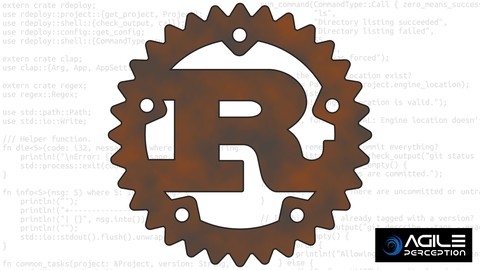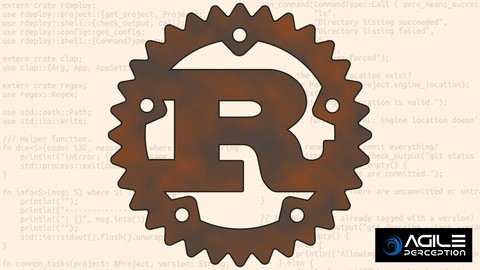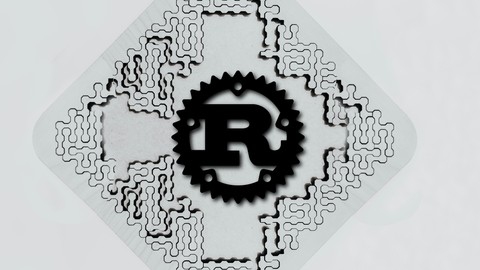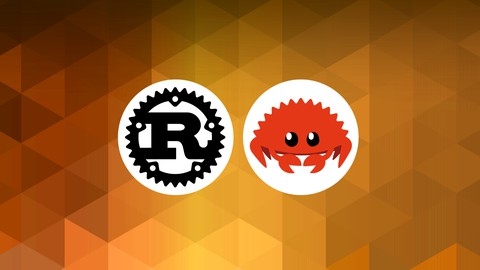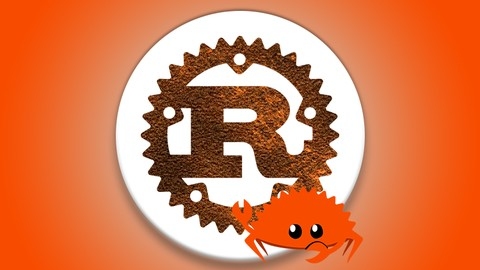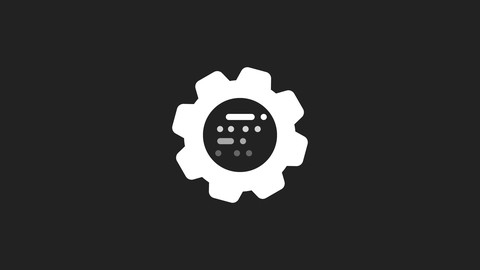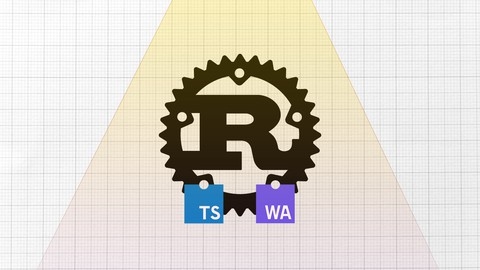Ultimate Rust Crash Course
The course starts by giving an overview of Rust - its history, goals, and why it’s an awesome language for systems programming.
You’ll learn about Cargo, Rust’s build tool and package manager, which will be invaluable as you start creating projects.
Next, you’ll dive into the fundamentals like variables, functions, and Rust’s module system for organizing code.
This lays the groundwork for understanding more advanced concepts later on.
The course then covers primitive data types, control flow constructs like loops and conditionals, and details on handling strings in Rust.
These basics are crucial for any programming language.
But the real meat is in the sections on ownership, borrowing, and references - core Rust concepts that ensure memory safety at compile time without needing a garbage collector.
You’ll grapple with these through exercises to solidify your understanding.
From there, it moves on to structs (Rust’s version of classes), traits (like interfaces), collections from the standard library, and enums - a powerful way to define unions of data types.
Hands-on exercises reinforce each topic.
The final lectures explore closures (anonymous functions), threads for parallel execution, and an end-to-end project building a terminal game with audio.
Working through a real project cements the concepts.
Learn Rust by Building Real Applications
You’ll begin by understanding what Rust is, how to install it, and set up your development environment.
This initial section also dives into the crucial concept of manual memory management, exploring the stack, heap, smart pointers, and even using GDB to visualize the memory layout.
Next, you’ll build a command-line application, learning the fundamentals like data types, functions, macros, mutability, the standard library, ownership, and borrowing.
You’ll reinforce these basics through quizzes and by debugging ownership and borrowing issues in GDB.
The real fun begins when you build an HTTP server from scratch.
You’ll learn about the HTTP protocol, TCP connections, structs, strings, enums, modules, error handling, parsing, lifetimes, and more.
Along the way, you’ll model the URL query string using hash maps, represent HTTP responses, work with environment variables, and serve HTML/files.
Interestingly, the course covers advanced topics like the “derive” attribute, copy/clone types, dynamic vs static dispatch, custom traits, and implementing getters.
You’ll also learn how to route incoming requests and handle them appropriately.
With quizzes at regular intervals and a final quiz, you can test your understanding.
The course strikes a good balance between theory and hands-on coding, ensuring you gain practical experience by building real applications.
The Rust Programming Language
The course starts by guiding you through installing and setting up the Rust toolchain, including the Cargo package manager and configuring an IDE like IntelliJ IDEA.
You’ll write your first “Hello, World!”
program to get a taste of Rust syntax.
The course then dives into the core data types like numbers, booleans, and characters.
You’ll learn about variables, operators, scopes, and constants.
It explains the crucial difference between the stack and heap memory areas.
Control flow is covered in-depth, including if statements, loops (while, for), and the powerful match statement for pattern matching.
You’ll build a simple combination lock program to practice these concepts.
Next, you’ll learn about Rust’s data structures like structs, enums, unions, and the Option
Arrays, slices, tuples, and pattern matching techniques are explored.
The course introduces generics to write reusable code.
It covers standard collections like vectors (resizable arrays), HashMaps (key-value stores), and HashSets.
You’ll learn how to use iterators with these collections.
String handling is an important topic, covering UTF-8 string types, formatting, and a number guessing game example.
Functions are discussed in detail, including function arguments, methods (functions within structs), closures (lambda functions), and higher-order functions that return other functions.
Traits are a core Rust concept, allowing you to define shared behavior across types.
You’ll learn about trait parameters, operator overloading, static/dynamic dispatch, and the special Drop trait.
The course explains Rust’s innovative ownership, borrowing, and lifetime rules that prevent data races and ensure memory safety at compile time.
You’ll learn about reference-counted variables (Rc/Arc) and using Mutexes for thread-safe mutability.
Advanced topics like circular references and concurrency (spawning/joining threads) are also covered.
Finally, you’ll learn how to consume external crates (libraries), build your own crates, write tests, and document your code.
Ultimate Rust 2: Intermediate Concepts
You’ll start by learning how to format your code consistently using rustfmt and catch common pitfalls with clippy.
This lays the foundation for writing clean, readable code that adheres to best practices.
Next, you’ll dive into documentation, a crucial aspect of any professional codebase.
You’ll learn how to generate a slick documentation website directly from your code comments, complete with intra-doc links and images.
Publishing your code on crates.io, Rust’s package registry, is also covered.
This allows others to easily use and contribute to your libraries.
The course then explores closures and iterators, which are fundamental concepts in Rust’s take on functional programming.
You’ll learn how to write concise, expressive code using these powerful tools.
Common traits from the standard library are demystified, teaching you how to derive and implement them for your own types.
This unlocks many of Rust’s built-in capabilities.
Error handling is a core strength of Rust, and you’ll learn how to create custom error types and handle errors robustly using the ?
operator and the anyhow crate.
Testing is paramount for reliable software, so you’ll learn how to write and run unit tests, integration tests, and even benchmarks using the criterion crate.
Logging is simplified with an introduction to the log crate and its macros, allowing you to easily add logging to your libraries and applications.
Concurrency is explored through multithreading, with guidance on spawning threads, passing data between them, and using channels from the crossbeam crate for inter-thread communication.
Finally, the course culminates in a hands-on project where you’ll build a game prototype using the Rusty Engine framework.
This project covers everything from engine initialization and game state management to handling input, rendering sprites and text, and playing audio.
Throughout the course, you’ll gain practical experience by completing exercises that reinforce each concept.
By the end, you’ll be equipped with the skills to write idiomatic, well-tested, and robust Rust code for any project.
Rust Programming For Beginners
The course starts with the fundamentals, covering data types, variables, functions, control flow statements, and basic syntax.
You’ll learn how to work with numbers, strings, and comments through hands-on coding exercises and demos.
The course then dives into decision-making with if/else statements and the powerful match expression.
You’ll practice using these constructs to control program flow based on different conditions.
Next, you’ll explore loops like loop and while to repeat code execution until a specific condition is met.
As you progress, you’ll learn how to create and work with custom data types like enums, structs, and tuples.
This will help you better organize and manage data in your programs.
The course also covers essential concepts like expressions, ownership, and memory management, which are crucial for writing safe and efficient Rust code.
You’ll gain experience working with collections like vectors and HashMaps, allowing you to store and manipulate groups of related data.
The course teaches you how to handle optional data using the Option type and how to manage errors using the Result type.
Towards the end, you’ll learn about traits, which enable you to define shared behavior across different data types.
You’ll also explore how to use external crates (third-party libraries) to extend the functionality of your programs.
The course includes two projects where you’ll build real-world applications, such as a menu-driven billing system and a personal contacts manager.
These projects will help you solidify your understanding of Rust by applying the concepts you’ve learned.
Additionally, you’ll learn how to write automated tests, generate documentation, and work with advanced features like lifetimes and memory references.
The course covers techniques like the new type pattern and custom error types, which are essential for building robust and maintainable Rust applications.
Rust Programming Course: From Beginner to Expert 2.0
You start with an orientation covering the course structure, setting up your environment, and running your first Rust program.
The course provides quick reference materials like cheat sheets to help you recall syntax easily.
In Part 1, you dive into the fundamentals - variables, data types, functions, control flow, and ownership/borrowing concepts crucial in Rust.
You’ll practice with hands-on coding exercises to solidify your understanding.
Part 2 explores intermediate topics like generics, traits, functional programming aspects (closures, iterators), and memory management features (lifetimes, smart pointers).
You’ll implement data structures like linked lists to apply these concepts.
Part 3 covers advanced topics like sized/unsized types, macros, the question mark operator, and partial moves.
You’ll tackle real-life coding problems involving data structures and algorithms.
Concurrency is a key strength of Rust, covered through concepts like threads, channels for communication, sharing state with mutexes, and async/await.
Part 4 is a bonus section covering web programming, text processing, file handling, and performance optimization tips.
If you’re interested in extra practice, Part 5 includes legacy material like implementing stacks, expression evaluation, and basic blockchain features in Rust.
The Complete Rust Programming Course
You’ll start by learning how to set up Rust on Windows, Linux, and macOS, ensuring a smooth development experience with Visual Studio Code.
Once you have Rust up and running, the course dives into the basics, covering variables, data types, functions, and control flow.
You’ll quickly grasp Rust’s principles like ownership, borrowing, and lifetimes, which are fundamental to writing safe and efficient code.
As you progress, you’ll explore structs, enums, pattern matching, traits, and generics, enabling you to create robust and reusable code.
The course also covers essential topics like error handling, testing, and working with common collections like vectors, maps, and sets.
But that’s not where it ends.
You’ll build a command-line interface (CLI) program for find and replace, gaining hands-on experience with file handling and text manipulation.
Additionally, you’ll delve into iterators, closures, pointers, and concurrency, mastering techniques for parallel programming with threads, channels, and shared state.
The course even touches on advanced topics like macros, unsafe code, and asynchronous programming with futures and async/await.
You’ll build a client-server application, showcasing real-world use cases for asynchronous Rust.
If you’re interested in WebAssembly, the course has you covered with a dedicated section on compiling Rust to WASM and creating web applications.
Throughout the journey, you’ll also explore algorithms and data structures, including recursion, sorting algorithms (like merge sort and quick sort), linked lists, stacks, queues, binary search trees, dynamic programming, graphs, and graph algorithms like depth-first search (DFS), breadth-first search (BFS), Dijkstra’s algorithm, and minimum spanning trees (MSTs).
Rust lang: The complete beginner’s guide
This course covers all the fundamentals you need to master Rust programming.
You’ll start by setting up your development environment and learning the basics of Rust syntax, including variables, data types, operators, and functions.
The course then dives into more advanced topics like modules, crates (Rust’s package manager), and generating random numbers.
One of the standout sections is on data types, where you’ll explore arrays, vectors, slices, tuples, structures, enums, and generics.
This solid foundation will prepare you for working with Rust’s powerful control structures like if statements, match expressions, and pattern matching.
The course doesn’t stop there - it delves into functions, covering scope, closures, higher-order functions, and macros.
You’ll also learn about traits, a key Rust feature for code reuse and abstraction, including trait generics, operator overloading, static and dynamic dispatch.
Crucially, you’ll gain insights into Rust’s innovative memory management model based on ownership, borrowing, and lifetimes.
Error handling is covered in-depth, equipping you with tools like the ? operator to write robust code.
Concurrency is a major strength of Rust, and you’ll learn how to leverage threads, channels, and mutexes to build concurrent applications.
The course culminates in three hands-on projects: a client-server chat app, a snake game, and a blockchain implementation, allowing you to apply what you’ve learned.
Throughout the course, you’ll engage with the instructor and community on social media, reinforcing your learning.
Rust: Building Reusable Code with Rust from Scratch
The course starts by teaching you the fundamentals of Rust, including bindings, mutability, built-in types, imports, and the standard library.
You’ll learn about recursive and dynamic programming approaches by building a Fibonacci calculator.
The syllabus covers installing Rust, managing toolchains, creating projects with Cargo, and exploring the crate ecosystem.
A significant portion is dedicated to understanding Rust’s unique borrow checker, which prevents memory safety issues.
You’ll dive into ownership, borrowing, RAII, shared and exclusive access, and how to work with the borrow checker effectively.
The course also covers essential Rust concepts like strings, vectors, slices, structs, enums, match expressions, and designing a markup language.
Moving forward, you’ll learn about traits, which are Rust’s way of defining shared behavior.
The syllabus covers built-in traits, writing your own traits, generic functions, and generic types.
You’ll explore how traits and generics are used in the standard library, including smart pointers, wrappers, and collections like vectors and hash maps.
The course delves into metaprogramming in Rust, teaching you about declarative and procedural macros, including custom derive rules.
You’ll see how macros are used in the standard library for formatting, introspection, conditional compiling, and error handling.
To tie everything together, the syllabus covers creating crates (Rust’s package system), using modules to structure code, working with dependencies through Cargo.toml, and publishing your crates to crates.io.
Throughout the course, you’ll work on practical examples like building a Barycenter finder (for computing gravitational centers), parallelizing it, implementing a markup language, and creating a library with unit and integration tests.
The course emphasizes writing reusable code, API design principles, and documentation.
Rust & WebAssembly with JS (TS) - The Practical Guide
You’ll start by setting up your Rust environment and learning the basics, like primitive types, variables, and functions.
The course then dives into more advanced concepts like ownership, borrowing, and references, which are crucial for writing safe and efficient Rust code.
As you progress, you’ll explore data structures like strings, structs, and enums, as well as traits, which allow you to define shared behavior across types.
Modularity is also covered, teaching you how to organize your code into reusable modules.
The course then shifts its focus to WebAssembly, a binary instruction format that allows you to run Rust code in the browser.
You’ll learn how to compile Rust code to WebAssembly, load it in the browser, and interact with it using JavaScript (or TypeScript).
To solidify your understanding, you’ll build a snake game using Rust and WebAssembly.
This hands-on project will cover topics like rendering graphics, handling user input, updating game state, and more.
Along the way, you’ll learn about important concepts like pointers, memory management, and performance optimization.
The course also covers deployment, teaching you how to package your WebAssembly application for production and serve it using a development server or a command-line interface (CLI) tool.
Throughout the syllabus, you’ll find AI-assisted lectures and examples, which provide additional explanations and insights.
The course also includes optional lectures on resolving issues and understanding the lecture structure, ensuring you have the support you need to succeed.
